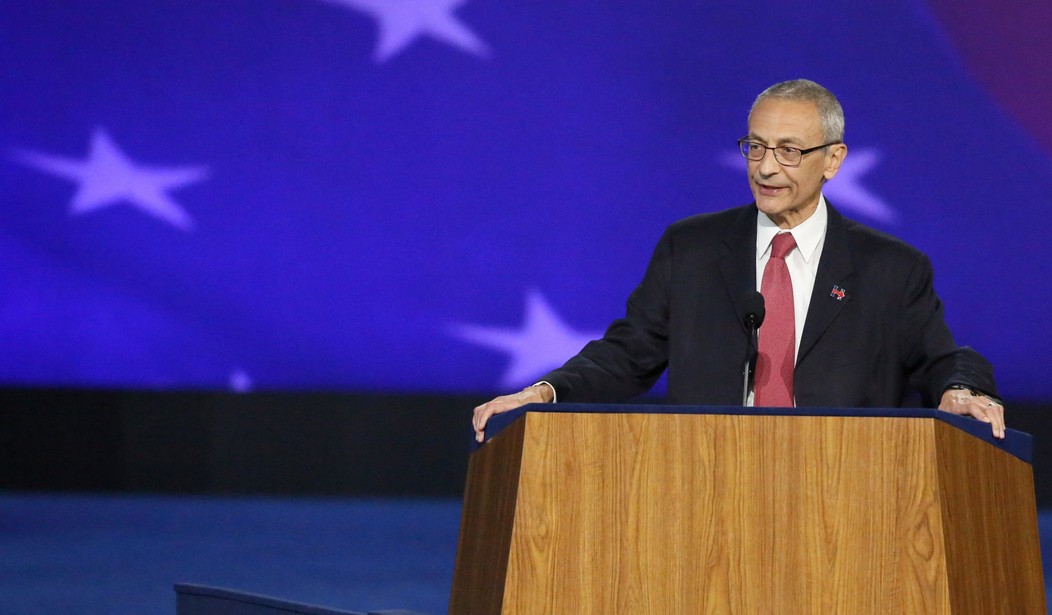WASHINGTON – John Podesta, the chairman of Hillary Clinton’s 2016 presidential campaign, told PJM that the fundraising agreement between the Democratic National Committee and the Clinton campaign was “for the general election,” not for the primary race against Sen. Bernie Sanders (I-Vt.).
Former DNC Chairwoman Donna Brazile wrote in her new book, Hacks: The Inside Story of the Break-ins and Breakdowns That Put Donald Trump in the White House, that there was a fundraising arrangement forged between the DNC and the Clinton campaign, which allowed the campaign to make internal party decisions.
NPR obtained a memo showing that Clinton reached an agreement in August 2015 to joint fundraise when the DNC was in debt and Clinton’s campaign was raking in cash. In exchange for the financial infusion, the Clinton camp got control over DNC internal operations.
Podesta said Brazile’s focus on the agreement is a “complete distraction” from President Trump’s policies.
“Well, I haven’t read the book. I think the agreement that she referenced was for the general election, and the agreement makes that clear and as Rahm [Emanuel] said, given the fact that Donald Trump is president of the United States and doing what he’s doing, this is a complete distraction,” Podesta said today after a “Clinton 25: Georgetown Reflects On The Vision Of Bill Clinton” event at Georgetown University.
When asked if the financial agreement gave Clinton an advantage over Sanders in any way, Podesta replied, “On its terms, I think it was raising money for the general election. And, by the way, Bernie had an agreement too – he just didn’t raise that much money for it.”
Podesta was also asked if he knew about the DNC and Clinton campaign paying Fusion GPS to research the infamous dossier on Trump after GOPs dropped the project, but he declined to comment.
During the “Clinton 25” event, Emanuel, the mayor of Chicago, said the controversy surrounding the DNC-Clinton agreement is irrelevant.
“It’s just really totally irrelevant. You have a president of the United States who is championing the most regressive tax policy, undermining America’s leadership around the world, undermining the country as a country of the rule of law and we’re arguing about an agreement from an election that none of us wanted the result, in the same way that the Bush family is arguing about the result of the nomination on their side,” he said.
“Nobody’s happy with the results. That you can conclude from this weekend. But my view is let’s focus on what we’ve got to do to win not only in 2018 and 2020 going forward – and it ain’t about looking back on some agreement that everybody has done before,” Emanuel added. “Please, as a mayor of a big city, trying to move a city and everybody in the city forward, give me something to fight for and something to believe in that bring people together and have a bigger vision… it ain’t relevant, brother.”
Before Wikileaks.org posted thousands of internal Democratic National Committee emails, Rep. Debbie Wasserman Schultz (D-Fla.), the chairwoman of the DNC at the time, said the DNC was “mutually managing” the primary race between Sanders and Hillary Clinton.
On April 30, 2016, Wasserman Schultz was asked if Sanders should “get out of the race at this point.”
“That’s not for the DNC to determine. We have 14 primaries left and we’re going to let those play out and let the candidates make those decisions on their own,” she replied. “But, mathematically, he’s not eliminated at this point, actually, so you know, we’re going to continue to mutually manage this primary as we have throughout the election.”
Brazile, who took over as the interim chairwoman of the DNC after Wasserman Schultz resigned at the beginning of the July 2016 national convention, wrote in her new book that she was “suspicious” the nomination process was “rigged” against Sanders. She criticized Wasserman Schultz over her leadership of the party.
“So I followed the money. My predecessor, Florida Rep. Debbie Wasserman Schultz, had not been the most active chair in fundraising at a time when President Barack Obama’s neglect had left the party in significant debt. As Hillary’s campaign gained momentum, she resolved the party’s debt and put it on a starvation diet. It had become dependent on her campaign for survival, for which she expected to wield control of its operations,” Brazile wrote, according to excerpts from the book.
“Debbie was not a good manager. She hadn’t been very interested in controlling the party—she let Clinton’s headquarters in Brooklyn do as it desired so she didn’t have to inform the party officers how bad the situation was. How much control Brooklyn had and for how long was still something I had been trying to uncover for the last few weeks. By September 7, the day I called Bernie, I had found my proof and it broke my heart,” she added.
Brazile’s book comes out on Tuesday: Election Day.
This story was updated at midnight to reflect NPR’s reporting on the DNC memo.









Join the conversation as a VIP Member